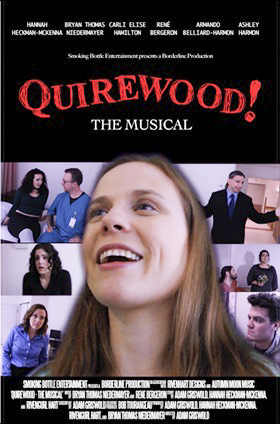Filmmaker and alum Adam Griswold ‘10 spent years thinking about producing a musical, but he has now made his mark on the theatre world with the release of Quirewood! The Musical, now available on Amazon Prime.
The musical is inspired by life in mental institutions based on the experiences of co-writer Hannah Heckman-McKenna. Kadence, the main character, is a patient in Quirewood Psychiatric Clinic who suffers from bipolar disorder. Along with her fellow institutionalized friends, she must navigate the changes in therapeutic practices brought about by the hiring of Dr. Jackson, the new lead psychiatrist.
Since graduating a decade ago, Griswold has written and directed several independent films such as Space People, Space People 2, and Suburban Spies, but Quirewood! is his first musical.
Griswold spoke to The Beacon about his experiences at Emerson and his work with Quirewood! The Musical. This interview has been edited for clarity and length.

Q. What was the inspiration behind Quirewood! The Musical?
A. It was about four years ago. I had been doing independent films for a number of years. I was on set of one project where a couple of friends and I started talking about musicals and we thought, “We should do a musical.” Between us, we knew people who could sing. We knew someone who could compose music.
It was early 2017, the four of us, [including] myself, Hannah Heckman-McKenna, Rivengurl Hart, and Bryan Thomas Niedermyer talked in a Facebook chat about what kind of musical we could do. And then Hannah mentioned that she had had experiences when she was younger in and out of mental hospitals. And we were all kind of thinking, “Yeah, there was something we could do with that as far as making a musical.”
Q. What do you hope the musical does in regards to the stigma surrounding mental health issues?
A. I learned more about these mental health issues than I had known before. I start recognizing things in myself and other people that raise awareness for mental health issues, and that there are systems that are broken and that is something that people don’t necessarily think of. A lot of people will still just throw around terms like, “Oh, this person must be mentally ill” and don’t really think most people who deal with mental illness are just innocent people who are really struggling and dealing with a system that is sometimes abusive to them.
Q. Why did you feel that you needed to be a part of a project like this?
A. I did like musical theatre in high school, and I enjoyed parts of it, but didn’t enjoy other parts. But a number of years ago when I was still in college, I wrote a screenplay for a musical, and it was just so much fun to write lyrics for songs to move the story forward. But it was something that initially was way too difficult to do. So almost a decade later, I finally had experience making films and met people who could compose music and sing and make that happen.
Q. What was your favorite part about working on Quirewood! The Musical?
A. It’s really just the whole process of seeing it come together. That is what I enjoy the most about all the films I do—just seeing it start from just an idea and then become something you can actually watch that comes out really well.
Q. Were there any difficulties that you faced?
A. From the whole musical aspect of it and the fact that none of us had ever done anything like that before. We weren’t really prepared for how much work it was gonna be, especially how long it was gonna take. I think we went into it thinking it would maybe take a little over a year. And it took two and a half. Just recording the initial tracks for the music was almost like an entire production under itself. It took over a year to get the actual music. It was a bigger effort than anyone anticipated. It had a pretty big cast, so trying to get all those people on set at once would always be a struggle too.
Q. Do you have a favorite memory from Emerson?
A. It was probably when I did the Los Angeles program, I did a summer program there. Getting away from Boston was fun because I live in the Boston area. Still do. I grew up here, so just getting away from that was really exciting for that period. It made me more optimistic and excited about the possibilities of what I can do in the future.
Q. What is there a specific moment in time where you decided you wanted to be a filmmaker?
A. I look back and I can remember being in elementary school and just imagining movies in my head. Like my brother and I, we would play with toys and stuff, and then I’d imagine it as a movie, just cinematic, with camera angles and music. Then, once I got to middle school and high school, I would occasionally be assigned projects to go make a video. It’s just always how it’s been.
Q. What advice would you give to young filmmakers?
A. When people would give me advice, I’d always be frustrated by people who would try to act like, “Oh, there’s one way of doing things. This is the only way you’ll get anything done.” I think you need to find what works for you because everyone’s different. Every project is different.